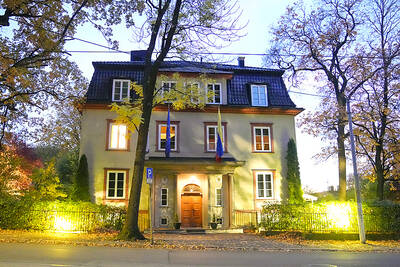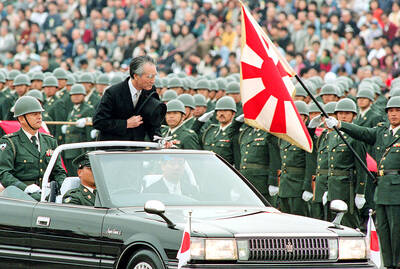Sudanese President Omar al-Bashir has vowed to press ahead with peace efforts in Darfur despite the international arrest warrant against him, ahead of a defiant weekend visit to the conflict zone.
“The ICC [International Criminal Court] will not change anything in the government’s plans and programs,” Bashir said in a statement published by the state news agency SUNA yesterday.
“The government will press ahead with all steps for peace ... and will conduct free and fair elections,” he told a late-night Thursday meeting of Sudan’s top politicians.
KILLINGS
His comments follow the ICC decision on Wednesday to issue an arrest warrant for Bashir for war crimes and crimes against humanity over the six-year conflict in Darfur that the UN says has killed 300,000 people.
The move has sharply divided the international community and raised deep concerns about the plight of the millions living in Darfur, often in miserable conditions in one of the remotest areas of the planet.
The US, which has said genocide was being committed in Darfur, is leading calls for him to be brought before international justice, but Sudan’s allies including Africa, the Arab world and China want the warrant suspended.
Bashir is due to travel to Darfur tomorrow, a trip seen as a deliberate show of defiance to the ICC, which accuses him of orchestrating a campaign of extermination, rape, forcible displacement and pillaging.
EXPULSION
Sudan has already sent a clear message to the world about the course it will pursue following the warrant decision — ordering the expulsion of 13 international aid agencies it accuses of collaborating with the ICC.
The UN, the US and the EU have issued calls for the decision to be revoked, warning of the harsh consequences for the hundreds of thousands of people reliant on aid in Darfur.
UN Secretary-General Ban Ki-moon said the decision, if implemented, would “cause irrevocable damage to humanitarian operations there,” spokeswoman Michele Montas said in a statement.
“Let’s be very clear, the lives of hundreds of thousands of people are at stake,” said John Clancy, European Commission spokesman for humanitarian aid.
The war in Darfur has made an estimated 2.7 million homeless and others are also at risk of disease and hunger.
Conflict erupted in February 2003, when ethnic minority rebels took up arms against the Arab-dominated regime for a greater share of resources and power, triggering a scorched earth campaign by Sudanese forces and allied militias known as Janjaweed.
Despite the warrant — the first issued by the ICC against a sitting head of state — Sudanese officials say Bashir will fly to the Qatari capital Doha soon for renewed Darfur peace talks, shrugging off the threat of arrest.
The ICC has called on all 108 countries party to the Rome Statute that created The Hague-based court to cooperate with the arrest warrant, but Qatar is not a signatory.
Khartoum and the Justice and Equality movement, the most active Darfur rebel group, signed a confidence-building pact in Doha last month designed to lay the groundwork for broader peace talks.

The Venezuelan government on Monday said that it would close its embassies in Norway and Australia, and open new ones in Burkina Faso and Zimbabwe in a restructuring of its foreign service, after weeks of growing tensions with the US. The closures are part of the “strategic reassignation of resources,” Venezueland President Nicolas Maduro’s government said in a statement, adding that consular services to Venezuelans in Norway and Australia would be provided by diplomatic missions, with details to be shared in the coming days. The Norwegian Ministry of Foreign Affairs said that it had received notice of the embassy closure, but no

A missing fingertip offers a clue to Mako Nishimura’s criminal past as one of Japan’s few female yakuza, but after clawing her way out of the underworld, she now spends her days helping other retired gangsters reintegrate into society. The multibillion-dollar yakuza organized crime network has long ruled over Japan’s drug rings, illicit gambling dens and sex trade. In the past few years, the empire has started to crumble as members have dwindled and laws targeting mafia are tightened. An intensifying police crackdown has shrunk yakuza forces nationwide, with their numbers dipping below 20,000 last year for the first time since records

EXTRADITION FEARS: The legislative changes come five years after a treaty was suspended in response to the territory’s crackdown on democracy advocates Exiled Hong Kong dissidents said they fear UK government plans to restart some extraditions with the territory could put them in greater danger, adding that Hong Kong authorities would use any pretext to pursue them. An amendment to UK extradition laws was passed on Tuesday. It came more than five years after the UK and several other countries suspended extradition treaties with Hong Kong in response to a government crackdown on the democracy movement and its imposition of a National Security Law. The British Home Office said that the suspension of the treaty made all extraditions with Hong Kong impossible “even if

Former Japanese prime minister Tomiichi Murayama, best known for making a statement apologizing over World War II, died yesterday aged 101, officials said. Murayama in 1995 expressed “deep remorse” over the country’s atrocities in Asia. The statement became a benchmark for Tokyo’s subsequent apologies over World War II. “Tomiichi Murayama, the father of Japanese politics, passed away today at 11:28am at a hospital in Oita City at the age of 101,” Social Democratic Party Chairwoman Mizuho Fukushima said. Party Secretary-General Hiroyuki Takano said he had been informed that the former prime minister died of old age. In the landmark statement in August 1995, Murayama said